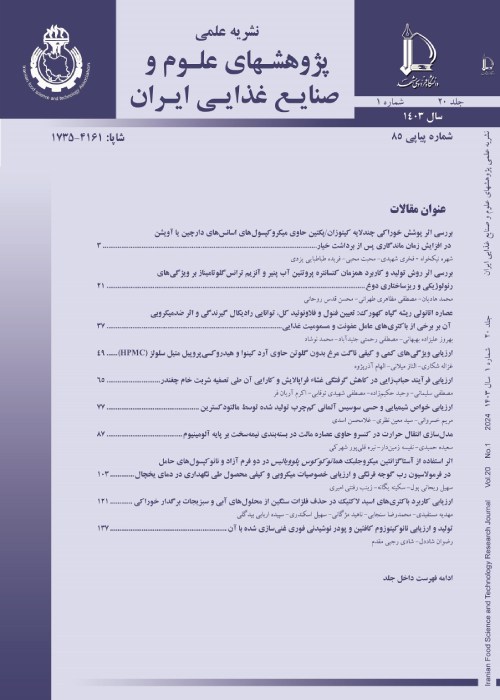Optimization of Iranian mentha longifolia of nanoemulsion containing omega-3 fatty acids by Spontaneous emulsification
Fish oil is an omega3 source, because it consists of a long chain polyunsaturated fatty acids (PUFAs), namely Eicosapentaenoic acid (EPA, 20:5 n-3) and Docosahexaenoic acid (DHA, 22:6 n-3) that are essential to all humans and provide multiple health benefits associated with brain development, cardiovascular disease, circulatory disorders, immune dysfunction and inflammatory disorders. The human body cannot make omega3 fatty acids on its own, so they must obtained from daily diet or supplements. Low uptake of this nutrient can cause serious problems. Lipid oxidation of fish oil and other PUFA-rich foods is a serious problem that leads to loss of shelf-life, consumer acceptability, nutritional value and functionality. On the other hands, omega3 cannot be incorporated into many functional foods, due to their poor water-solubility, chemical instability and low bioavailability, so some ways should be used to protect PUFAs such as microencapsulation and Nanoemulsion. The performance of low-energy methods has become very popular due to the lack of expensive equipments and ease of production. In this research, nanoemulsion of omega-3 fatty acids was prepared by spontaneous emulsification method using Iranian mentha longifolia essential oils.
Fish oil was purchased from zahravi company comprised of 101 mg of EPA/g of oil, 148 mg of DHA/g oil, and 312 mg of total omega-3 PUFA/g of oil. Nonionic surfactants Tween 80 and Tween20 (Sigma Aldrich, St. Louis, MO, USA) and Sodium caseinate (MP Biomedical LLC. (Solon, OH) were purchased from chemical suppliers. Distilled and deionized water obtained from a water purification system (Milli-Q, Millipore, Darmstadt, Germany) was used to prepare all emulsions. All other chemicals used in this study were either Sigma-Aldrich (St. Louis, MO) or Fisher Scientific (Pittsburgh, PA). Iranian Shallot oil (penny royal oil) was purchased from magnolia company (Iran). The supplier reported the chemical composition as determined by gas chromatography-mass spectroscopy instrument (GCMS-QP2010 SE, GAS, Shimadzu, Japan). Factor A contains the omega 3 percent (25 to 75 percent), factor B contains surfactant-to-oil ratio (SOR %), (10-300 percent), Factor c contains surfactant type (Tween20, Tween80, T80:T20 and caseinate sodium) and factor d contains storage time (1-60 days) to achieve optimal production formula were selected. Physicochemical characteristics of Nanoemulsion including pH, peroxide value, turbidity, creaming index, D43, span, antioxidant, brix, refractive index and TBA were studied and Optimization of formula was performed by Response Surface Method (D-optimal design) The results were analyzed using design expert software (ver11).
Preparation of Nanoemulsion based on Iranian mentha longifolia oil loaded with omega 3 fatty acids by a low energy emulsification technique to protect it was evaluated in this study. The initial size of the droplets depended on surfactant type, surfactant concentration, storage time and omega3 concentration. Emulsions made of the highest surfactant concentration produced the smallest droplet sizes and were physically stable. It was found that the most important parameter effecting final emulsion responses was surfactant concentration. Our results showed that oxidative stability could be improved by the increasing surfactant concentration, also Iranian mentha longifolia antioxidant compounds were effective in reducing peroxide index and delaying oxidation. In all surfactants, by increase omega3 content, antioxidant activity was decreased. Results showed that all four examined variables affected the provided emulsion characteristics and the following conditions were obtained as optimum; storage time of 40 days, SOR %: 100, T80:T20 and omega 3 (29.31%). These nanoemulsions and essential oils can be applied to prevent undesirable off flavor fish oil and can be applied to fortify food or beverage systems with omega3 fatty acids.
- حق عضویت دریافتی صرف حمایت از نشریات عضو و نگهداری، تکمیل و توسعه مگیران میشود.
- پرداخت حق اشتراک و دانلود مقالات اجازه بازنشر آن در سایر رسانههای چاپی و دیجیتال را به کاربر نمیدهد.



